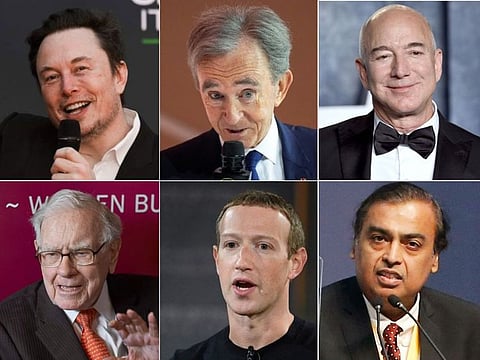Trillion-dollar question: Who will be the first trillionaire?
Peacemaking is the ultimate prerequisite for long-term wealth building, prosperity

The elusive $1 trillion mark has long been a coveted milestone in the world of wealth.
While several individuals have amassed immense fortunes, the coveted title of the world's first trillionaire remains up for grabs.
So, who are the frontrunners, and what factors could propel them to this extraordinary achievement?
The usual suspects
The most likely candidates for the trillionaire title are the tech titans who have already amassed massive wealth. Elon Musk, with his ventures in electric vehicles, space exploration, and artificial intelligence, is a strong contender.
As per Forbes, Musk has topped the list of richest persons in the world, given his shares in Tesla and SpaceX, among others. He's worth $270.5 billion as of October 1,2024, from $241 billion in August. He moved back into the No. 1 spot in late May 2024, after Tesla shares recovered from a market slump.
Also in the running are Jeff Bezos, the founder of Amazon, who is worth $205 billion; and Bernard Arnault, the CEO of LVMH, had a net worth of $193 as of October 2024. So is Larry Ellison of Oracle, whose net worth was estimated at $179 billion.
Bill Gates, founder of Microsoft, has an estimated $161 billion to his name this month. Mark Zuckerberg, the CEO of Meta Platforms, Inc. (formerly Facebook). His net worth is estimated to be around $120 billion as of October 2024.
Beyond the tech titans
While the tech industry has dominated the wealth rankings in recent years, other sectors could also produce a future trillionaire.
Warren Buffett, the legendary investor, has built a massive fortune through his holdings in Berkshire Hathaway.
And in emerging markets, individuals like Mukesh Ambani, the chairman of Reliance Industries, have the potential to amass immense wealth through diversification across various industries. Ambani, 66, is currently the richest Asian, whose net worth of $119 billion.
Factors to consider
Several factors could influence who becomes the first trillionaire:
Economic growth
A strong global economy can fuel rapid wealth accumulation. Periods of economic prosperity can create opportunities for entrepreneurs and investors to amass substantial fortunes.
Technological advancements
Breakthrough innovations in sectors like artificial intelligence, biotechnology, and renewable energy could create new wealth-generating opportunities.
Market fluctuations
The stock market can be a volatile place, and significant fluctuations can impact individual wealth. A well-timed investment or a successful exit strategy could propel someone to the trillionaire club.
Government policies
Tax policies, regulations, and economic incentives can influence wealth accumulation. Changes in these policies could impact the trajectory of potential trillionaires.
The race is on
While it's impossible to predict with certainty who will become the first trillionaire, the individuals mentioned above are well-positioned to achieve this milestone.
As technology continues to advance and the global economy evolves, the race for the $1 trillion mark is sure to intensify.
Geopolitics
Here's the most important condition not just for the would-be trillionaires listed above, but for the rest of the world: Wealth building, ultimately, is contingent on peacemaking.
Societies and businesses can only flourish in an atmosphere of security. Peace fosters economic stability, attracting investments and encouraging entrepreneurship, both essential for wealth creation.
"Peace dividend" is often used to reflect reduce costs, and greater share in the economy. Conflict and instability lead to increased spending on defense, healthcare, and reconstruction, diverting resources from economic development.
Peace also builds trust and cooperation. Both are necessary among individuals, businesses, and nations in order to facilitate trade, investment, and innovation.
In conflict-ridden regions, resources are often diverted from education and healthcare, hindering human development and limiting the potential for economic growth.
Peacemaking, ultimately, is essential for humanity to flourish, tackle common challenges and usher in sustainable development. This ensures that economic growth is balanced with social and environmental well-being.



